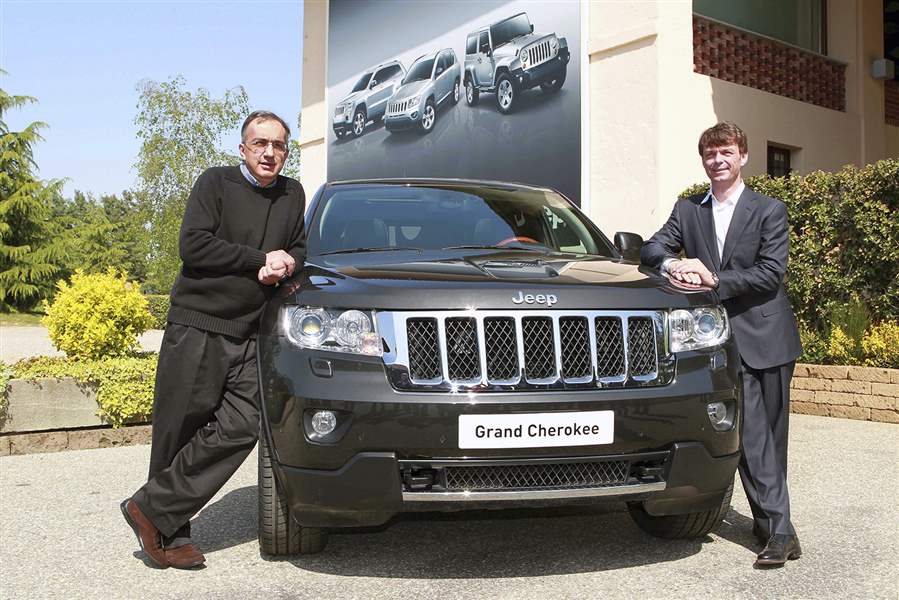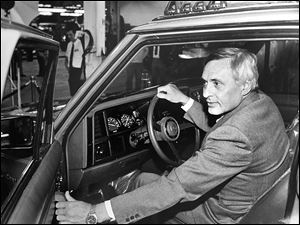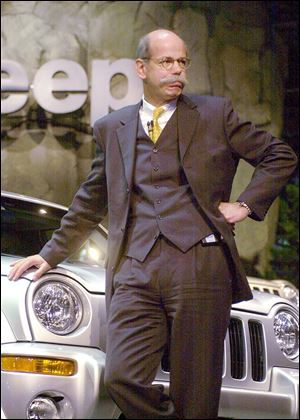
Through ownership changes, Jeep brand not so All-American
Owners, parts from different nationalities
8/27/2017
Fiat Chrysler CEO Sergio Marchionne leans on a Grand Cherokee Jeep near Turin in 2011, two years after the Italian company took over the Jeep brand.
Lapresse
Jeep is often seen as the most American of brands — an automotive personification of a local war hero who grew up right and did the community proud.
But it’s a lot more complicated than that.
For roughly 20 of the last 38 years, Jeep has been controlled to an extent by foreign owners — French automaker Renault in the 1980s, Germany’s Daimler-Benz in the 1990s and 2000s, and since 2009, Italy’s Fiat.
“This vehicle is an American icon that helped win World War II,” noted Michelle Krebs, senior analyst with AutoTrader. “But if you really look at its past, it’s been owned by a lot of different companies of various nationalities.”
RELATED CONTENT: Automaker in China has eye on Jeep ■ Toledo Jeep Fest looks to celebrate brand’s future

Jeep has been controlled by foreign owners for roughly 20 of the last 38 years, including the French Renault and Jose Dedeurwaerder, who helmed AMC Motors and Jeep, in the 1980s.
Over the past couple weeks, reports have emerged that several cash-laden Chinese carmakers, including sport-utility vehicle specialist Great Wall Motor Co., are kicking tires at Fiat Chrysler.
That was jarring for some, given that all-American reputation. But the fact is that Chinese investment is already here for Toledo’s Jeep operation.
Early this year, Chinese appliance maker Midea purchased Kuka AG, a German robotics firm whose North American operations include the factory that welds together Wrangler bodies for Fiat Chrysler Automobiles’ Toledo Assembly Complex.
Fiat Chrysler employees paint the vehicles and do all final assembly work, but it is the Kuka plant next door — with about 500 employees — that unquestionably plays a major role in the building of the rugged sport utility vehicles.
While Great Wall’s interest in Jeep made national news, the $5 billion sale of Kuka barely registered, even in Toledo. Several usually in-the-know officials admitted this week they hadn’t heard about it, while union leaders say it’s just business.
“We felt no effects on the shop floor. Nothing has changed except the owners,” said Bruce Baumhower, president of United Auto Workers Local 12, which represents employees at both Kuka and FCA.
If the union was matter-of-fact about the Kuka sale, it was similarly pragmatic about a potential sale of Jeep to a Chinese auto maker.
“We’ve worked for the French at Renault and the Germans at Daimler and now we’re working for the Italians at Fiat,” Mr. Baumhower said recently. “We’ve been resilient through all of it. Every one of those owners came in and said ‘Wow, what an operation,’ so I would expect the same from the Chinese.”

The German company Daimler- Chrysler AG had control of Jeep in the 1990s and 2000s. Chief executive officer Dieter Zetsche showed off the 2002 Daimler- Chrysler Jeep Liberty in Detroit in 2001.
Kuka didn’t respond to a request for comment, and FCA declined to comment.
But Paul Zito, vice president of international development for the Regional Growth Partnership, which has a close relationship with Kuka, said Midea has taken a decidedly hands-off approach. Midea has kept in place Kuka’s leadership — both locally and in Germany — and allowed its new subsidiary to more or less continue running its operations the same way it always had.
The Jeep experience with foreign owners since the 1980s has been somewhat similar as it rolled along under the French, the Germans, and the Italians.
“We’ve demonstrated in each of those cases that we’ve been able to meet whatever challenges are thrown at us. We seem to have become a much stronger company than we were years ago,” said Jerry Huber, a former Chrysler executive who managed the Toledo plant under Renault’s Jose Dedeurwaerder, who helmed AMC Motors and Jeep, and later DaimlerChrysler AG and its colorful CEO, Dieter “Dr. Z” Zetsche.
“I think each owner, each business relationship, impacts their management style, their manufacturing direction, goals, and objects, and the way they measure things, but that’s not all bad,” Mr. Huber said.
To be sure, there was grumbling from inside the plant during the Renault years that the French automaker did not understand the American automaking culture. And the DaimlerChrysler relationship ended in a less-than-amicable divorce.
But Jeep rolled on, and Mr. Huber said the brand is probably better for it.
“Jeep has been a really strong automotive name. We built a reputation for survival, for resilience,” he said.
“We’ve had a lot of dance partners over the years.”
The Chinese companies that have been investing in the United States — and there are many — are generally doing so because there are opportunities here, Mr. Zito said, “not to tear things down and relocate it to China.”

Fiat Chrysler CEO Sergio Marchionne leans on a Grand Cherokee Jeep near Turin in 2011, two years after the Italian company took over the Jeep brand.
Another local example of that was Shanghai Regal Metal Materials Co. Ltd.’s purchase of the MagreTech facility in Bellevue last year. The plant, which supplies recycled magnesium to automakers and other auto suppliers, had been set to close. The purchase saved 28 jobs and the new owner added another 35 employees.
“The main goal of foreign direct investment is to capitalize on the market in that country or that territory,” Mr. Zito said.
Still, it’s not even clear how serious any of those reported conversations between Chinese suitors and FCA officials have been.
Last week, a Great Wall Motors official told the trade publication Automotive News that it was the company’s intention to buy Jeep. But the company quickly walked that back in a financial filing, telling investors there was “substantial uncertainty” as to whether it would pursue such a move. The company also noted it has “not built any relationship with the directors of FCA nor has the Company entered into any discussion or signed any agreements.”
Meanwhile, Fiat Chrysler Automobilies, which has its headquarters in London, said Friday it would evaluate any inquiries about a potential transaction.
And the Italian automaker has been doing its best to increase the attractiveness of Jeep.
It largely has walked away from small and midsize cars and devoted considerable resources toward Jeep. FCA has already expanded the brand’s portfolio and has more models coming, including a Jeep truck to be built in Toledo. It is putting money in the U.S. plants that build Jeep, including $700 million here in Toledo.
It also has focused efforts outside the United States, adding local production of some models in Asia and Latin America. Global Jeep sales grew from about 731,000 in 2013 to more than 1.4 million last year. Officials are on record saying they want to hit 2 million units globally by the end of 2018.
Meanwhile, Fiat Chrysler Chief Executive Officer Sergio Marchionne repeatedly has said the industry must consolidate. Seemingly, that’s particularly true for Fiat Chrysler. While profitable, analysts say the company likely doesn’t have pockets deep enough to fully go it alone in developing the advanced technologies such as electrification and self-driving vehicles.
Mr. Marchionne has publicly courted partners to that end, though his efforts have so far come up short. Even so, many analysts see FCA’s all-in strategy with the Jeep and Ram brands as an effort to make the company more appealing to potential buyers. Those two brands are widely recognized as being the most valuable assets in FCA’s holdings.
Jeep on its own may be worth more than the company as a whole. In a July note to investors, Morgan Stanley analyst Adam Jonas presented a sum-of-the-parts evaluation that pegged Jeep’s value at 120 percent of the the market value of all of FCA. By 2018, Mr. Jonas wrote, Jeep is likely to contribute almost three-quarters of the company's global earnings, factoring out interest, tax, depreciation, and amortization costs.
But selling Jeep has its own perils.
“The question to me was would they really sell off Jeep, because it doesn’t leave you with much,” said Ms. Krebs, the AutoTrader analyst. “Jeep is going to go on. It’ll either be owned by Fiat Chrysler or it’ll be owned by someone else. Jeep’s future is bright.”
Until something concrete happens, Mr. Baumhower won’t speculate on what a sale of Jeep might mean for Toledo and the 5,000 or so people who work at the local plant.
“The only concern we ever have is the effect it’s going to have on our membership, and it’s too early to tell what effect that would have,” he said.
Contact Tyrel Linkhorn at tlinkhorn@theblade.com, 419-724-6134 or on Twitter @BladeAutoWriter.